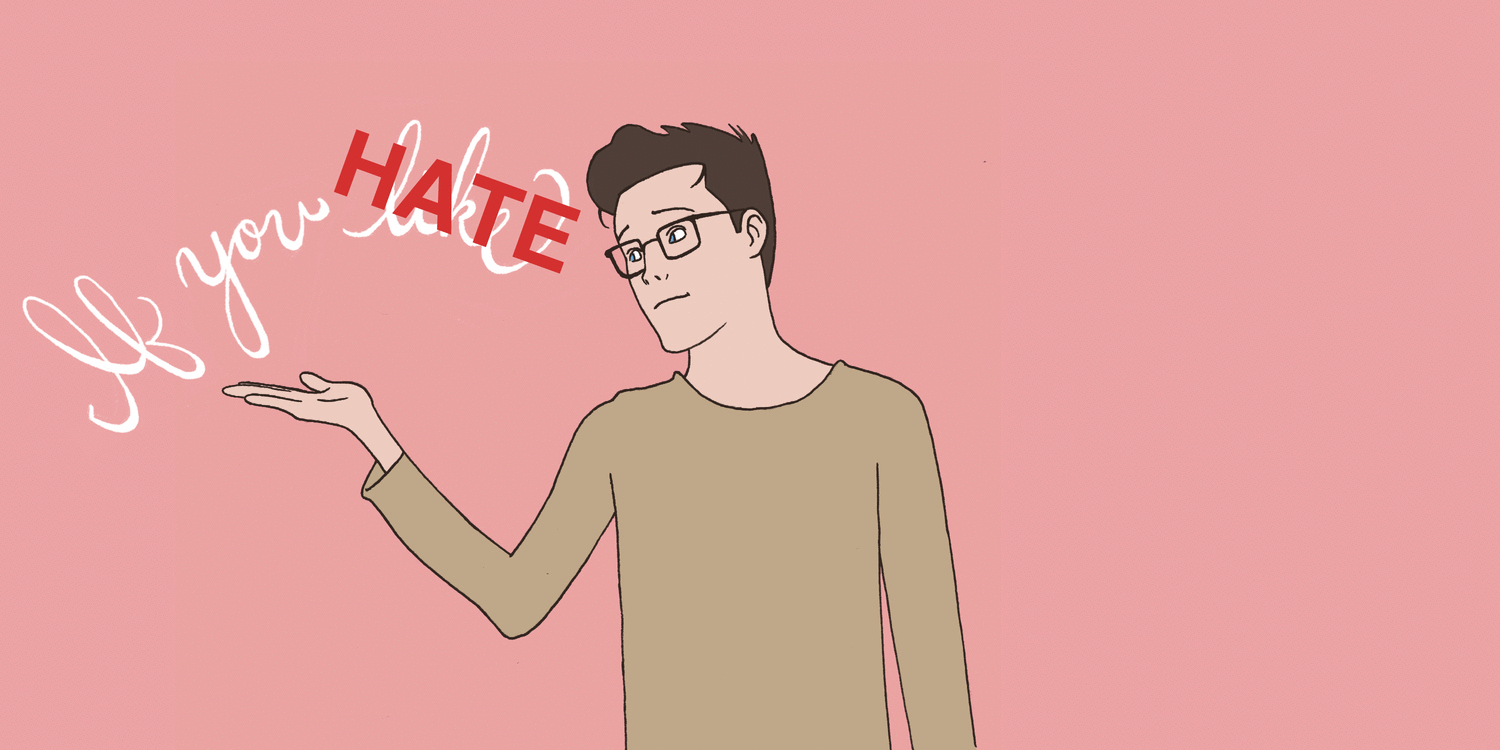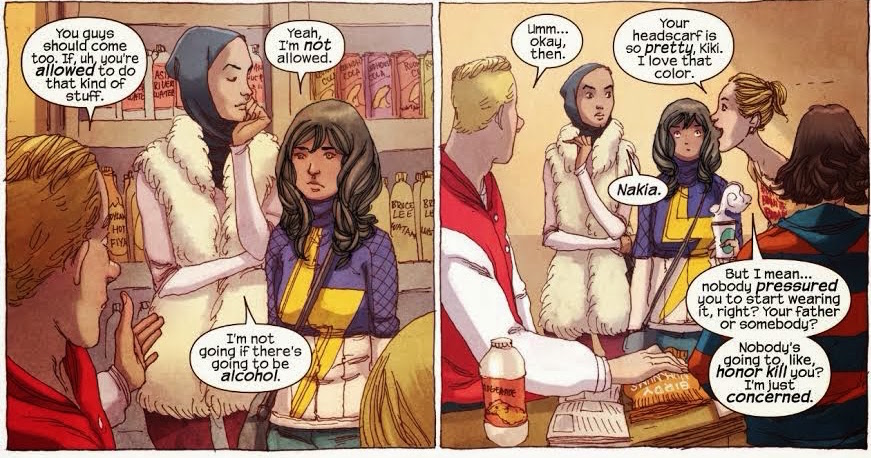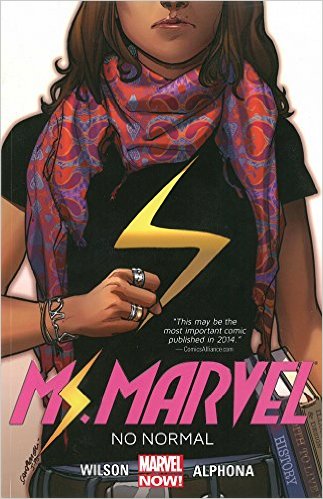
In IYL(H)TR, Brian Fabry Dorsam puts his passion for unsolicited recommendations to use. Hate a certain bit of politics? Brian’s got a comic book suggestion for you!
Last weekend, President Drumpf signed an executive order that closes our borders to Muslim refugees, immigrants, and American residents (which is to say, Americans) traveling from Iraq, Iran, Libya, Somalia, Sudan, Syria, and Yemen. If you’re a person with feelings, this was, to say the least, upsetting.

Protests erupted across the country. Thousands of people swarmed the international terminals of major airports to demand that detained travelers be released. Meanwhile, the American Civil Liberties Union (ACLU) argued a federal court case against the order and convinced US District Judge Ann Donnelly to block the deportation of people currently being held in American airports.
While Drumpf has apparently rejected the term “Muslim ban,” he was, in fact, the first person to use it. He has said that he signed the order to protect Americans (except for the Americans he’s detained, of course), which is difficult to understand given that there have been zero fatal attacks by immigrants from the countries in Drumpf’s ban since 1975. Coincidentally (?), the Muslim-majority countries excluded from the ban seem to have ties to Drumpf businesses.
When Attorney General Sally Q. Yates declared that Justice Department lawyers would not defend the ban until she determined that it was legal, Drumpf fired her.
Meanwhile, a federal judge has blocked the ban and the President is left to ponder the fact that he cannot fire the judicial branch.
If you hate President Drumpf’s Muslim ban, then read “Ms. Marvel” by G. Willow Wilson and Adrian Alphona.
The mantle of Ms. Marvel was formerly held by blonde-haired-blue-eyed Carol Danvers, but G. Willow Wilson reimagines the character as a Pakistani Muslim teenager from Jersey City named Kamala Khan. Starting from your basic toxic-gas-gives-our-hero-strange-powers premise, “Ms. Marvel” is about more than watching Kamala “embiggen” her fists to sock ne’er-do-wells; it quickly becomes a deep, poignant exploration of faith and humanity.

Kamala is Marvel’s first leading Muslim super-lady, so it was important to Wilson, a Muslim woman herself, to do things right.
Wilson said, “There is a real danger for it slipping into tokenism, sort of slapping a new face on the cover and saying ‘Look … Diversity! Hooray!’ That’s not what I wanted to do at all.”
Wilson counters this, in part, by creating Kamala as a young woman struggling to find herself within her faith: “She’s very conflicted in some ways about her faith, like a majority of American Muslim women. She does not cover her hair, and does not wear a headscarf.”
At times, Kamala’s responsibilities to her faith and her family are directly in conflict with her responsibilities as a hero. While Wilson always wanted to “portray Kamala as someone who is struggling with her faith,” we never feel as though her faith is in jeopardy. Kamala is struggling precisely because her faith is so strong. This is what makes “Ms. Marvel” complex. Kamala’s challenge is to find her truest self amidst an ever-growing bombardment of external and internal pressures.
 Wilson isn’t afraid to get political. Careful not to make Jersey City “the backdrop of the series,” Wilson lets it set the stage: “Jersey is her turf, it’s where she grew up and she’s not an apologist about it,” Wilson said in an interview with Newsarama.
Wilson isn’t afraid to get political. Careful not to make Jersey City “the backdrop of the series,” Wilson lets it set the stage: “Jersey is her turf, it’s where she grew up and she’s not an apologist about it,” Wilson said in an interview with Newsarama.
When Kamala’s hometown starts to see an influx of hip, young, white kids taking over local property from people of color, she takes on the developer who plans to “Clean Up Jersey City.” But there’s more to this gentrification than meets the eye. What follows is a complex examination of the roots of cultural and geographical taste-making, as Kamala starts to see images of Ms. Marvel adorning real-estate billboards, making her a symbol of the very repopulation she’s fighting to stave off.
In a political climate rife with Islamophobia, sexism, and xenophobia, it is impossible to overstate the importance of seeing a Muslim woman of color, with immigrant parents, acting globally by fighting locally. Sure, now that Kamala is a full-on Avenger we can see her face-punching galactic enemies (alongside a black man, a Latino teen, and a cancer-stricken woman – Marvel Cinematic Universe be damned), but it’s most powerful to see her on her own and on her own turf.
Wilson says, “A huge aspect of ‘Ms. Marvel’ is a ‘second string hero’ in the ‘second string city’ and having to struggle out of the pathos and emotion that can give a person.” Kamala constantly struggles with her place as a bumbling, inexperienced teenager in a world of Iron Men, Hulked-up supergeniuses, and adamantium-boned mutants. Many of us face this daily. How do we affect meaningful change against such a towering enemy? Kamala becomes a proxy for all of us struggling to find a way forward in an increasingly discouraging political climate. When called to challenge massive and unrestrained evil, are we ready? Are we able? When it comes to it, are we willing?
Pick up “Ms. Marvel Volume 1: No Normal” from pretty much any comic book shop in the free world and help the campaign to make “Ms. Marvel” the best-selling comic in February.








